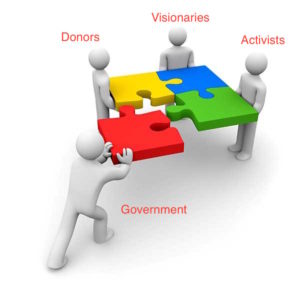 I quickly realized that the initial idea of the DealWorkshop, a dynamic platform for creating deals out of opportunities, fueled by the motivation of job-seeking professionals, can be just as well applied to the nonprofit sector.
I quickly realized that the initial idea of the DealWorkshop, a dynamic platform for creating deals out of opportunities, fueled by the motivation of job-seeking professionals, can be just as well applied to the nonprofit sector.
In the business version of the DealWorkshop we provide value for the triangle of Investors, Owners, and Experts. Investors seek quantifiable and verifiable investment products which can be measured against a standard and quickly acted upon. Owners are sellers of revenue-generating vehicles in the form of real estate or businesses, looking for capital, but often coming short of presenting their opportunity as an income-producing asset. Both Investors and Owners need the work of Experts, who research and add value to the opportunity, creating a viable investment product out of it. How do Experts get paid? By becoming partners in the deal through predetermined shares and commissions, which significantly exceed their hourly wage, since they deliver the service in advance. DealWorkshop creates jobs.
In the nonprofit version, the Investors are the Donors, the institutional and private sponsors who wish to see profound change in society, and who are looking for active teams on the ground who are passionately committed to a noble cause. The Owners of Opportunity are the Visionaries, the founders of nonprofit organizations who wish to create an impact and are looking to expand their vision and activity, seeking sponsorship for their worthy cause. The Experts and Professionals are Activists in civil society who wish to be involved in the community they care about, and even though much of their contribution is voluntary, they are eventually looking for a career opportunity and economic sustainability in their work. How do Activists get paid? By becoming partners in fundraising through predetermined agreements to become part of a team and take on positions of responsibility once funding is available. DealWorkshop creates jobs.
The great need for funding
In every enterprise, every revolutionary big idea, there is a need for funding to get the project off the ground and tell the world about it. Money is necessary to maintain operations and achieve measurable impact. I have experienced first hand both as an employee of the Municipality of the Capital City of Budapest, working with civil organizations, and as a representative of an advocacy group lobbying in the European Parliament in Brussels, that one of the key issues in the nonprofit sector is funding. Most charities and NGOs are not prepared for the need for corporate-style professional fundraising activity, and their activists are usually not involved in the process, resulting in ignorance, false expectations, and broken careers.
A friend from the business community, József Tóth, introduced me to István Kormos, who developed, in my view, a revolutionary system for funding nonprofits. I was so inspired by the concept and the initial results (traction) after long years of development, that I joined the startup team of the UK-based LAHA (Love All Help All Foundation). The basic idea of the LAHA platform is that a donation is forwarded to charities after everyday purchases, by the business, not the customer. The customer gets to decide which charity to donate to, but the business determines the percentage of the donation. The donation is basically part of the purchase price and is actually given by the business. In this way the business can remain neutral in case their customer supports a political or religious cause, the customer feels they have made a contribution to a worthy cause, and the charity begins to form new relationships with the corporate sector. And here is the key, relationships. Relationships are the foundation of fundraising. Through LAHA the corporate sector takes on the funding of civil initiatives, very ethical and very practical. In countries where the civil sector is heavily dependent on government, and therefore is not really “civil,” LAHA helps promote democracy, for the most popular organizations will get the most funding. Brilliant, since LAHA also builds bridges between corporate giants (as well as the corner grocery) and the community they operate in.
Government
I have experienced that local governments worldwide are encouraged by the benefits of social entrepreneuring projects like DealWorkshop and LAHA. DealWorkshop encourages entrepreneurship, education, creates jobs, and attracts foreign direct investment (FDI). The nonprofit spinoff of DealWorkshop helps form a more responsible, sustainable, and mature civil society, where volunteers act as catalysts in the funding of projects which ease the burden on government, bring development and investment, jobs, to a region. LAHA relieves government of the constant demands for funding by nonprofits, enabling legislators to simply connect the companies and nonprofit organizations operating in their jurisdiction, enhancing community life, making civil society more civil and effective.
Name
What would be an appropriate name for the “nonprofit spinoff” of DealWorkshop? Maybe DreamWorkshop? I would love to hear your feedback and suggestions!
